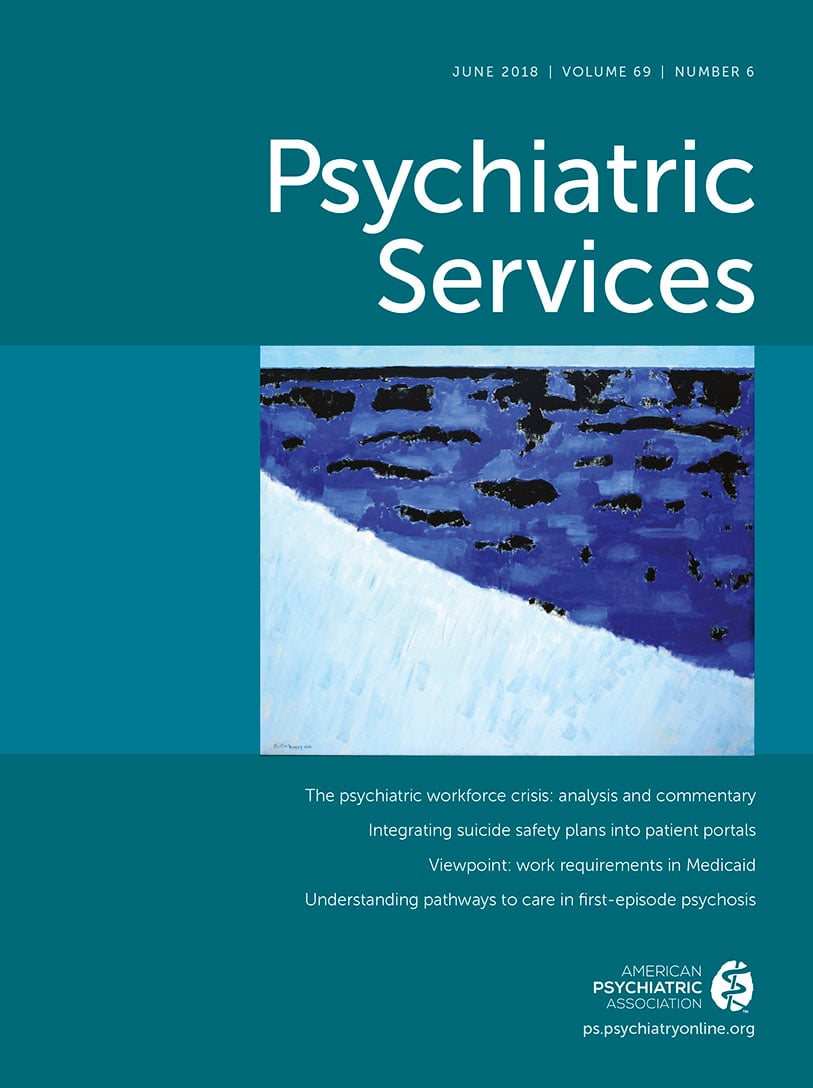Nearly 15 years ago, Snowden described how racial and ethnic bias might adversely affect mental health assessment and intervention (
1). Since then, emerging scholarship has focused on understanding bias as a determinant of health outcomes. Today, the biased provision of health services is a well-documented barrier to health for marginalized populations (specifically, those who have been excluded from full participation in broader society because of identifying characteristics) (
2). Explicit forms of bias (specifically, intentionally discriminatory behaviors) have been the primary focus of health equity interventions to date (
3).
Conversely, implicit bias is a far subtler form of discriminatory action and is often outside of an individual’s conscious awareness. Despite conscious efforts to provide equitable care to all patients, studies show that at least two-thirds of health providers hold some form of implicit bias against marginalized groups (
4). Implicit biases can negatively influence a provider’s willingness to engage in patient-centered care, provide referrals to specialized treatment, or even adhere to evidence-based guidelines when serving diverse populations (
4). Mental health systems are particularly vulnerable to the negative effects of implicit bias because the diagnosis and treatment of mental health conditions rely heavily on provider discretion. As such, providers’ unconscious attitudes about groups such as homeless persons, veterans, people of color, or incarcerated individuals, among others, can have multiple negative consequences for individuals seeking mental health treatment (
5).
Hall and colleagues synthesized research on implicit bias among health care professionals and found that most studies focused on general medical outcomes, with limited attention on how biases operate in mental health settings (
4). Therefore, we aim to extend the research of Snowden (
1) and of Hall et al. (
4) to highlight key contextual pathways by which implicit bias influences mental health disparities among marginalized populations. This Open Forum extends previous arguments in three ways: by accentuating points of potential bias across the mental health care continuum, highlighting the role of first responders in the treatment trajectory, and examining bias in the ever-expanding intersections between mental health and criminal justice systems. We conclude by pointing to key areas for future research on implicit bias and mental health, so that researchers may begin to disentangle how implicit bias operates in mental health care.
Accessing Mental Health Care
Implicit bias can preclude certain groups from accessing mental health services. Unlike other types of health care that use an interprofessional, team-based approach, mental health services are frequently provided on a one-on-one basis, so that a single provider is the gatekeeper to accessing care. Thus, there is perhaps a greater potential for implicit bias among mental health professionals that prevents certain groups from accessing some mental health services. A recent study used audio recordings of potential psychotherapy clients to show that middle-class white women are far more likely than working-class black men to get a call back when requesting an appointment (
6).
Even when a member of a marginalized community gains access to an appointment (outside of emergent-care settings), implicit biases may shape how a mental health professional views certain behaviors. Consider, for example, a black man who has grown up in a society where men and boys of color are disproportionately targeted by law enforcement (
7). His vigilance in everyday life might be perceived as a natural consequence of racial profiling by one provider, whereas that same behavior might be interpreted as paranoia related to schizophrenia by another (
8). This single difference in how a provider interprets symptom presentation can dramatically alter subsequent discussions surrounding the patient’s psychiatric symptoms or screening for specific conditions.
Even with standardized diagnostic criteria in the
DSM-5, providers of mental health services are more likely to underdiagnose affective disorders and overdiagnose psychotic disorders among patients from marginalized groups compared with the majority (
9). With misdiagnosis comes the likelihood that mental health professionals will fail to refer patients to the appropriate health care professionals or will inadvertently withhold treatment. This situation presents an even bigger challenge with respect to engaging with communities on recognizing signs of mental illness. Further exploration is therefore needed regarding how service providers’ biases might influence mental health care engagement.
Short- and Long-Term Treatment
Patients with mental disorders often require long-term care to control symptoms throughout the life course. Rapport between patient and provider can thus influence long-term treatment adherence. Despite the importance of this therapeutic alliance, persons with mental illness often report poor care experiences (
10). Furthermore, patients with mental illness commonly experience microaggressions from health professionals throughout the care process (
11). These negative experiences with professionals may lead members of marginalized groups to question the benefit of seeking mental health services, which may decrease treatment adherence. Moreover, these negative individual experiences may extend to the broader community, perpetuating social norms that discourage treatment seeking for psychiatric problems. Thus, the process of building increased trust, satisfaction, and continuity in the mental health care continuum should begin with an examination of clinical bias within the health care system.
Crisis Care
Emergent situations may arise when someone with a mental health condition is in crisis. As such, it is imperative that emergency personnel, including emergency medical providers and first responders, become aware of implicit biases that can affect crisis services. Implicit biases might lead a first responder to interpret someone in crisis as dangerous or violent rather than as experiencing frustration or fear during a crisis (
12). Given the documented mental health disparities in emergency care settings (
13), additional attention must be paid to how implicit biases negatively affect patients in this setting. Moreover, establishing formal collaborations between law enforcement and mental health clinicians, including mental health crisis training of first responders, may mitigate potentially harmful interactions that arise in community-based crisis management.
Criminal Justice
Although most persons with mental illness are nonviolent, abnormal behavior associated with mental disorders is often regarded as deviant and dangerous, which creates a double-bind of criminalization and mental illness diagnosis (
7,
8). As such, we cannot analyze the role of bias in the mental health care system without also acknowledging the role of the prison industrial complex. Detainees with mental illness compose almost 50% of the U.S. correctional population, making the prison system one of the largest mental health providers in the country (
14).
Implicit stereotyping of abnormal behavior as dangerous can result in disproportionate contact with the criminal justice system. Scholars have noted that contentious interactions between first responders and individuals with mental health conditions can exacerbate symptoms as a result of the trauma of arrest and incarceration (
15). Further scrutiny of biases within law enforcement and judicial settings is necessary to understand how prejudices against people with mental disorders and other marginalized groups may manifest as differential criminalization and disproportionate incarceration. Possible solutions may include additional partnerships between criminal justice and mental health professionals to readily identify and adequately treat persons with mental illness without resorting to incarceration.
Implications and Directions for Future Research
Implicit biases of mental health service providers can contribute to the misinterpretation of emotional expressions and high health care costs associated with improper treatment. These effects can perpetuate mental health disparities throughout the care continuum. Research is needed at multiple junctures to examine the prevalence of implicit bias among mental health professionals, including a more exhaustive literature review than is presented in this commentary. Such a review could highlight intersections of bias and criminalization and offer a critical analysis of bias within psychometric assessments.
Moreover, manifestations of implicit bias may vary by type of mental health practitioner (family therapists, pastoral counselors, psychiatric nurses, psychiatrists, and social workers, for example) and in relation to priorities set during professional training. By comparing mental health professional stances, we may be able to identify professional education that addresses implicit bias among trainees holistically. Future studies should also examine how implicit biases may present differentially among marginalized populations. Practitioners might have very low levels of implicit bias against one social group (such as people of color) yet strong bias against another group (such as LGBT+ people), which can contribute to intersectional mental health disparities. An intersectional research framework would provide a more nuanced understanding of implicit bias.
Additional research is also needed to explicate how practitioners’ implicit attitudes affect the provision of mental health services and effectiveness of treatment. Implicit bias might prevent help seekers from accessing services, lead to incomplete assessment or misdiagnosis, contribute to ineffective care management, or lead to disconnections from care. Beyond the behaviors of individual practitioners, future inquiries should also investigate how structural inequities in the mental health system might perpetuate bias. These might include the lack of diversity in the mental health workforce and those who educate these professionals, evidence-based practices that are centered on a majority-group framework, and lack of diversity on the boards of mental health agencies.
Finally, more intervention research is needed to prevent and reduce implicit bias in the mental health system. To our knowledge, there is limited empirical work in this area. Potential mechanisms to target individual and group interventions include increasing meaningful conversation between practitioners and marginalized populations, enhancing empathy among providers for disadvantaged groups, and facilitating self-reflective activities for professionals about their own biases. These interventions should include mental health trainees as well as professional development with current practitioners.
Conclusions
Implicit bias pervades the mental health system. Mental health systems have unique threats to the equitable delivery of services and thus deserve research attention. These biases affect every aspect of the mental health care continuum, from screening to treatment, and additional research should further consider how implicit biases may affect health service delivery and subsequent outcomes. From biases that limit access to screening to misinterpretations of symptoms and to lower-quality care, there are many points along the continuum of mental health care that could benefit from a more intentional consideration of how implicit biases may affect the delivery of these services. We recommend that future research focus on understanding and addressing the issues presented here.

